Why my car battery won’t hold charge? If it’s also your question, then you are in the right place.
Whether it’s a new car battery or a used car battery, if there are issues in your battery that eventually won’t hold a charge.
Today I will discuss the reasons that are widely practiced for the battery charge holding problem.
Then, lastly, I will show you one of the most common reasons why this is happening. I hope this article will save your car battery from serious issues.
How Car Battery Systems Work
To know why car battery won’t hold charge you first need to understand how car batteries work. There are three types of batteries in the Automobile industry (SLI, Li-ion, Lead-Acid).
Most of the car’s batteries are the SLI type SLI stands for “starting, lighting, and ignition.” Almost every car battery relies on a lead-acid chemical reaction to get things moving and running.
SLI type of battery provides short bursts of energy to power your Light, accessories, and car engine. When the car battery jolts the engine to life, the car’s power is supplied by the alternator.
The car alternator converts mechanical energy to electrical energy, and this power goes to the car battery, and your car runs on car’s electric energy. That’s why proper grounding of a car battery is important.
Learn More: Charge A Car Battery Without A Charger
Why Car Battery Won’t Hold charge
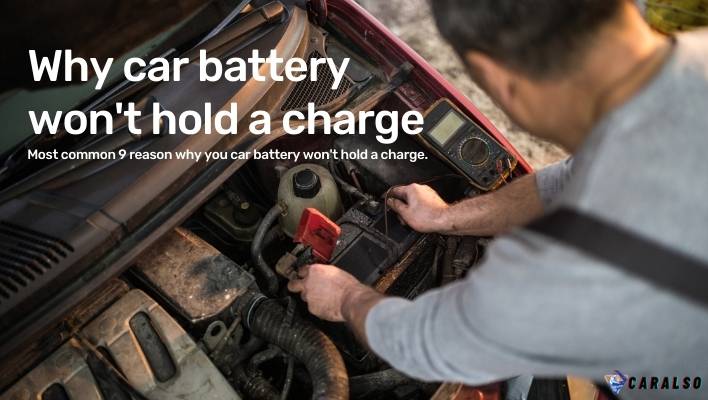
A bad alternator, the age of the battery and most importantly the parasitic electrical drain on the battery cause a battery not to hold a charge. Sometimes for mechanical charging issues, this problem occurs in your battery.
If your car battery isn’t holding a charge, there are certainly problems somewhere in your vehicle that must be diagnosed and reconditioning that car battery as soon as possible.
Let’s see what causes a battery not to hold a charge:
Reason 1: Bad Alternator or Broken Alternator
Reason 2: Battery Low Water Level
Reason 3: Corroded Battery Cables
Reason 4: A Fuse is Defective
Reason 5: Loose or Old Alternator Belt
Reason 6: Bed Cell in The Battery
Reason 7: The Car Battery is Old
Reason 8: Parasitic Battery Drain
Reason 9: Corrosion All Over The Battery
Reason 1: Bad Alternator or Broken Alternator
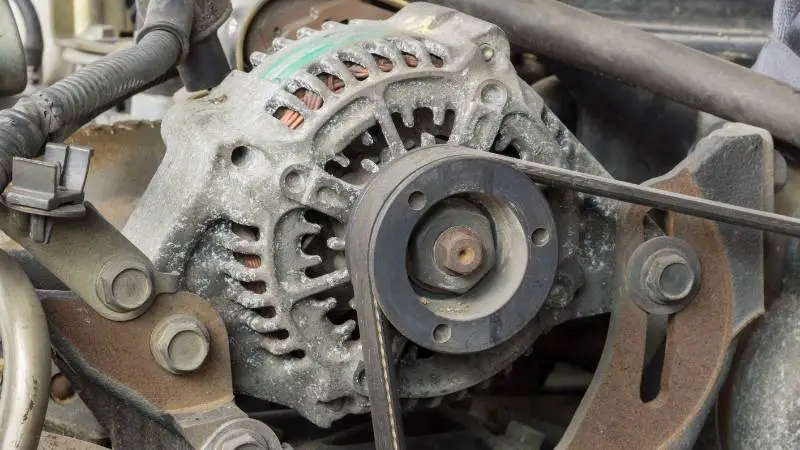
No matter what, when it comes to the battery charging problem, You might ask yourself, “Is it the car battery or the alternator.”
The car alternator’s job is to charge the battery when the car is running. If the car alternator is not charging the battery while the car engine is running, that is the reason why the car battery will not hold a charge.
You can notice this when you jump the car battery, and the engine runs for a while; after some time, the car battery eventually dies.
Another observation is watching your car headlight. While the engine is running, check the headlights.
If they start bright but slowly fade and you can notice that properly, the chances are high that it is the alternator, not the battery.
Always avoid overcharging alternators because overcharging brings some serious issues in the car alternator.
Tips: Before you replace anything, make sure that your car is thoroughly inspected for this reason.
Reason 2: Battery Low Water Level
As we know, when it comes to types of batteries. There are two types of batteries. One is a battery that has a hole in it.
This type of battery allows you to fill water in the battery and maintain it. These batteries are old models, and only some batteries have this option.
Other types of batteries are maintenance-free. Most of the modern batteries are maintenance-free and don’t allow you to add water to a battery.
If you have a maintainable battery, you can be topping off the battery water level, which may solve the problem.
The interesting part of owning a maintainable battery is that you can make distilled water for your car battery and fill the battery. Or, If you have a maintenance-free battery, you have to talk to your car mechanic.
Learn More: Put A Car In Neutral With A Dead Battery
Reason 3: Corroded Battery Cables
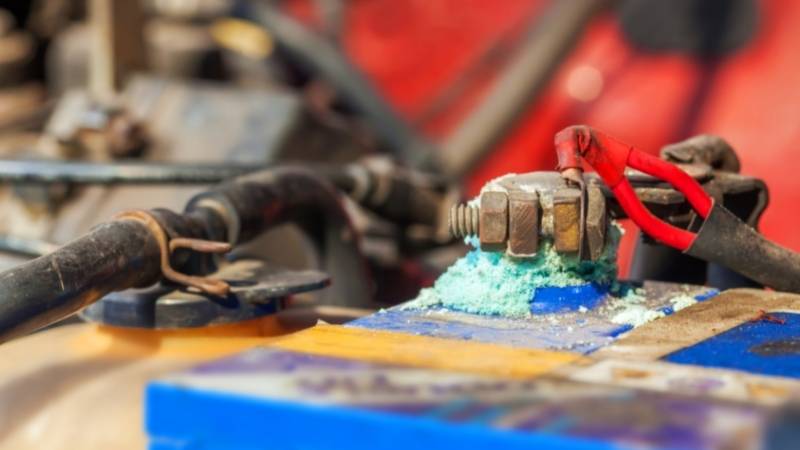
The battery terminals and battery cables suffer from corrosion when it builds up all over the battery and cable.
Corrosion prevents solid contact and limits the charge being supplied to the car battery from the alternator. As a result, the car battery won’t hold a charge.
Maintenance tips to prevent corrosion from battery cables:
- Apply battery-terminal grease on the battery terminal regularly.
- Keep your car battery terminal clean. Some cheap ingredients can help you clean the battery terminal; with baking soda or vinegar you can clean battery terminals.
- If the car cables have minor corrosion, remove them and clean them.
- Regular proper maintenance of your car can prevent car battery corrosion.
If your car battery cables have been corroded, you should test battery cables to look for issues in the charging system.
Reason 4: A Fuse is Defective
Even a very simple thing in your car battery can create problems easily with your car battery. I have seen lots of new car batteries that won’t hold a charge at all because of a defective or blown fuse.
Defective fuses cause many problems in your car battery, but fixing the fuse is relatively easy when you detect that.
However, before you fix a defective or blown fuse, you must be certain and diagnose the problem correctly.
Reason 5: Loose or Old Alternator Belt
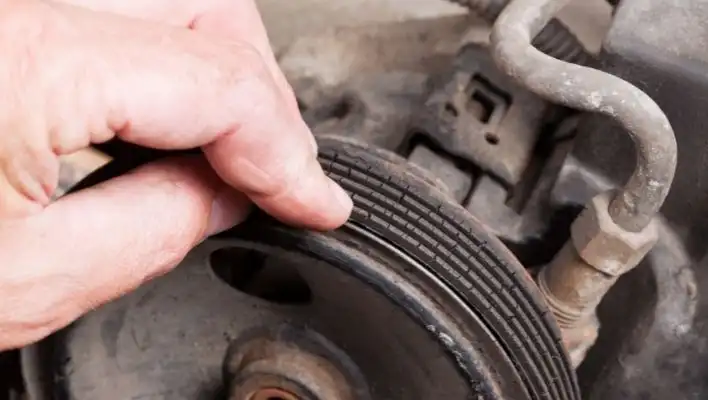
Isn’t battery holding a charge for a loose or old alternator belt? Yes. The alternator’s belt (also known as drive belt) job transfers power from the engine crankshaft to various other components in your car.
If the alternator’s belt is loose or bad, it will not provide charge to the battery, and eventually, your new car battery won’t hold charge.
Alternator belts get loose anytime, even. So alternators could lose while you are driving the car. That’s why you should look after your car’s alternator.
Reason 6: Bed Cell in The Battery
As we know, using a battery for a long time typically decreases battery energy. In addition, batteries most commonly die more in cold weather rather than hot. So when your battery cell gets bad, it brings some issues in your car.
When you have a bad cell in your car battery, then the battery cannot hold a charge overnight.
This is because bad cells in the battery prevent it from holding a charge, and the shorted cell does not allow the battery to hold the required amount of direct current voltage.
That’s why you should replace the cells in your car battery or fix dead cells in the battery.
Reason 7: The Car Battery is Old
Like I said earlier, batteries would eventually die no matter what. When batteries get old, they lose their energy. So at that time, they stop working as they should be.
If your battery is too old, your car battery won’t charge at all. So you will need to replace your car battery as soon as possible.
And when you go to buy a car battery, make sure you buy an appropriate model of a car battery. This will help you to avoid putting the wrong size battery in your car.
Another thing you should consider when you are going to buy a car battery is choosing a compatible car battery and car battery charger.
Without a compatible battery, your battery voltage can fluctuate while driving, and also other issues may occur.
Also, to read a battery charger amp meter properly, you will need a highly recommended battery charger.
Reason 8: Parasitic Battery Drain
Parasitic battery drain is when power continues to be drained from the car battery after the car engine is off.
This could be something as simple as leaving the car’s lights on, an accessory plugged into an always-on power outlet, And anything that drains the car battery after your car engine is totally off.

Parasitic battery drain shortens battery life in the short term. And for the long term, the parasitic drain can make a haul in car batteries.
For this reason, car batteries cannot work properly. So you should be careful about parasitic battery-draining whenever you leave your car.
Reason 9: Corrosion All Over The Battery
Even if your car battery isn’t old or everything is ok with an alternator. But too much corrosion around the battery can still be the reason why a car battery won’t charge. Car battery corrosion is really irritating.
Corrosion all over the car battery that prevents reaching proper charge from the alternator. Regular and proper maintenance can relieve corrosion from the car battery. You can even clean your battery with coke.
How To Diagnosing Car Battery That Won’t Hold Charge
The car’s dim headlights and low battery voltage are the most common signs that tell your old car battery or new car battery won’t hold charge. If both are symptoms your car has, you should check your car’s battery charge capacity.
Diagnosing a car battery that won’t charge or won’t hold a charge is pretty simple. There are multiple ways to diagnose this problem.
But I will give you some of the most common symptoms to tell if your car battery is not holding a charge.
Here are four symptoms how to diagnose car battery that won’t hold charge:
- Dim Headlights
- Battery Worn Out
- Alternator Not Working
- Low Battery Voltage
#1 – Dim Headlights
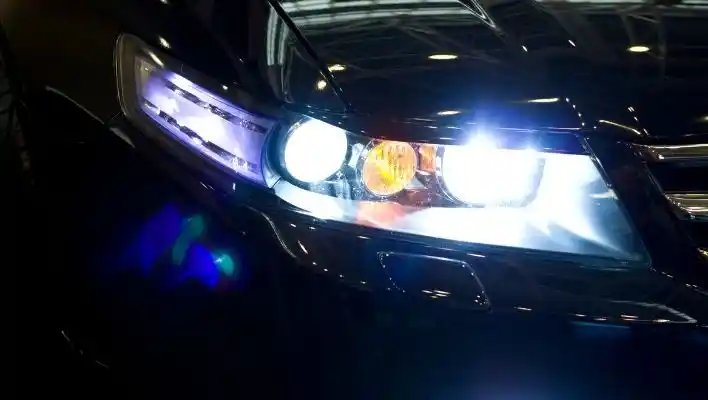
Try to turn on your headlight if the lights don’t turn on at all or the headlight dimmer than normal. Then this problem is more likely with the car battery.
If you detect this problem with yours, then you should talk to your car mechanic ASAP.
Bonus tips: If your car headlights and radio won’t turn on, and your car also won’t start, then the problem is usually a dead car battery. This is the fastest way to tell if a car battery is dead.
#2 – Battery Worn Out
If you drive a car for a long time, you can notice some changes and the battery performance of your car battery.
Some noticeable questions are: does your car battery look correct or worn out, does your car battery make a clicking sound, and so on.
If you notice your car battery is less performing while you are driving, you should check your battery with a professional.
#3 – Alternator Not Working
Car batteries and alternators are connected to each other. If your car battery doesn’t hold a charge, cause the alternator or alternator cables.
If the alternator cables crack or fray, this is an obvious sign of a car battery problem.
#4 – Low Battery Voltage
Read the car battery gauge, and if it reads a lot less than usual, then you should test the car battery to see the battery’s health.
Get a voltmeter and connect the red lead to the positive terminal; the black lead to the negative terminal.
For example, if you get the voltmeter display 12.6 volts, then there are no issues with your car battery.
These are the ways to tell if your car battery is not holding a charge. Make sure you follow these ways to take further action on your car battery.
Frequently Asked Questions (FAQs)
How many volts should a car battery have?
Fully charged car battery volts should measure at 12.6 volts or above. When the car engine is running, the measurement should be 13.7 to 14.7 volts. This is the ideal voltage of a car that is running on the road.
When the car is idle, The car battery voltage should be 13.8 volts to 13.8 volts. You should remember the battery voltage varies with the battery types and size.
How long should a car battery hold charge?
Car battery’s charge holding capacity depends on weather and temperature. A good-condition car battery can hold a charge for at least two weeks without needing you to start the car and drive to recharge the car battery.
However, if you don’t intend to drive your car for some time for whatever reason, you should still start it up once a week to recharge the 12V battery.
What is the most common sign of a bad car battery?
The most common sign of a bad car battery is car battery age. A car battery life expectancy is typically between four to six years.
Six years is the average life expectancy for a car battery. Several factors determine how long your car battery lasts—for example, water conditions, vehicle type, and driving habits.
Can a bad alternator destroy a new battery?
A bad alternator can destroy a new battery quickly because a failing alternator can overcharge and damage the battery.
An overcharged alternator leaves the battery completely flat. That’s why every car owner should check the car alternator regularly to look for issues.
Final Thoughts
The car battery is an essential part of our vehicle. Anything that happens to the car battery can affect the whole car’s performance.
If you are a car owner, it’s your responsibility to take care of your car battery charger.
I talked about the most common reasons why car batteries won’t hold a charge, but there are so many reasons left, which can happen with your car battery.
So now you also be able to tell why your car battery is not holding a charge.
You should always be careful about your car battery. If you always look up your car battery, you will save a lot of money from waste.
A simple issue like parasite draining or corrosion in a car battery could be a significant problem day by day if you ignore it in the first place.
Now It’s Your Turn
I’d love to hear from you.
Which one of the reasons why your car battery won’t hold a charge?
Let us know in the comment below.
If you get any help from my post, please share this post and help others on social media.
Thank you for visiting my website. Have a good day

Hey there,
How is it going?
I’m Meraj Sarker. I am a Car Mechanic and a student of Automobile Restoration here in Florida, USA. I’ve been studying automotive for around 9 years now. So you can rely on my recommendation. For me, studying and getting knowledge about automobile it’s really fun and entertaining. I will help you to get solutions for your car through this website. If you need any help let me know.

Removed battery from vehicle with a voltage reading of 7 put it on charge over night (12hrs) and now only 9point5 . It’s an acid lead . battery about 4 years old the vehicle is only used once in a while.
Hello Lawrence,
How you doing today?
If you have acid lead battery, you can also fix your car battery by following Epsom salt solution for battery that won’t hold charge.
Thank you.